|
|
|
Sort Order |
|
|
|
Items / Page
|
|
|
|
|
|
|
| Srl | Item |
| 1 |
ID:
190428
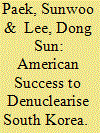

|
|
|
|
|
| Summary/Abstract |
This article explains the US curtailment of South Korean nuclear development by attributing this success primarily to the inducements President Ronald Reagan offered. These inducements were reliable because the US as a superpower operating under bipolarity, cared about its reputation as a trustworthy ally and was eager to provide inducements to its interest-sharing client. The inducements exposed Seoul to only a small risk of subordination, given the US’s position as a remote patron. By contrast, the sanctions Reagan’s predecessors threatened to impose were marginally effective, and could only delay Seoul’s nuclear pursuit because geographical remoteness gave them modest credibility.
|
|
|
|
|
|
|
|
|
|
|
|
|
|
|
|
| 2 |
ID:
111154
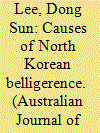

|
|
|
|
|
| Publication |
2012.
|
| Summary/Abstract |
This article explains the heightened aggressiveness that North Korea has shown since late 2009. It argues that a combination of militarism and frustration amplified by precarious leadership transition caused Pyongyang's astonishing belligerence. Simultaneously, it calls into question common alternative accounts pointing to either excessive or insufficient engagement or a presumably uncontrolled military as the primary cause for North Korean hostility. In addition, the article argues that North Korean aggressiveness is channelled towards South Korea (rather than the United States) and particularly its western maritime frontier, because there are especially acute grievances in that region and safer grounds for implementing militaristic policy.
|
|
|
|
|
|
|
|
|
|
|
|
|
|
|
|
| 3 |
ID:
174730
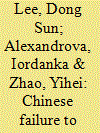

|
|
|
|
|
| Summary/Abstract |
This article explains China’s abortive attempt to stop North Korean nuclear development between 1993 and 2016. It attributes this failure to two international conditions. The first is geographical contiguity. As an adjacent great power, China had limited leverage over North Korea. Beijing’s threats of sanctions lacked credibility, as sanctions could trigger dangerous local instabilities. Its security inducements implied a risk of subordination, which Pyongyang was unwilling to accept. The second is the unipolar international system. Unipolarity curbed Beijing’s ability to protect Pyongyang from the United States, while simultaneously inducing China to pass the buck of restraining North Korea to the American unipole. This article corroborates these main arguments by drawing upon primary and secondary sources in Korean, Chinese, and English.
|
|
|
|
|
|
|
|
|
|
|
|
|
|
|
|
| 4 |
ID:
079706
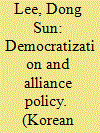

|
|
|
| 5 |
ID:
079583
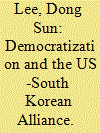

|
|
|
|
|
| Publication |
2007.
|
| Summary/Abstract |
This article explains why, in the wake of South Korea's democratization, the US-Republic of Korea alliance has suffered a steady decline while avoiding an abrupt collapse. The author argues that democratization weakened this asymmetric alliance by increasing the political influence of nationalism in South Korea. New South Korean democratic elites, subscribing to nationalist ideals, demanded an autonomous, equal relationship with the United States regardless of the de facto power disparity between the two countries. These elites also deemphasized the security threat from North Korea-with which they perceived a shared national identity-and adopted an unconditional engagement policy with that nation. The United States, in turn, resented the apparently unrealistic policies of these elites and showed a decreased interest in the alliance. Democratization, however, did not cause an abrupt end to the alliance, for two reasons. First, North Korea's military strength preserved a significant strategic need in South Korea for allied support. Second, as the result of a measured transition process, old pro-alliance elites in South Korea retained enough political clout to proscribe a radical shift in foreign policy away from the alliance with the United States, while new elites had opportunities to reconcile their nationalist ideals with strategic realities.
|
|
|
|
|
|
|
|
|
|
|
|
|
|
|
|
| 6 |
ID:
186178
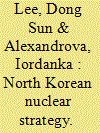

|
|
|
|
|
| Summary/Abstract |
What nuclear strategy has North Korea adopted? What factors have driven the development of this nuclear strategy? This article examines the key attributes of Pyongyang’s nuclear program to offer possible answers to these questions of scholarly and practical importance. It argues that North Korea has likely adopted an assured retaliation strategy, threatening a nuclear second strike to deter US nuclear attacks. This strategy was chosen due to its superior feasibility and desirability: it requires only a modest cost-effective nuclear arsenal, reduces Pyongyang’s security dependence on Beijing, permits politically safe centralized control over the nuclear weapons, and is also relatively economical. This article calls into question the common views that North Korea has employed a catalytic strategy using its nuclear capabilities to induce China’s assistance, and that Pyongyang is developing an asymmetric escalation strategy or a brinkmanship strategy, which utilizes nuclear weapons primarily to counter the superior conventional forces of its adversaries.
|
|
|
|
|
|
|
|
|
|
|
|
|
|
|
|
| 7 |
ID:
079854
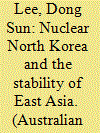

|
|
|
|
|
| Publication |
2007.
|
| Summary/Abstract |
This article aims to assess the strategic implications of North Korea's nuclear development. It calls into question the conventional wisdom that Pyongyang's atomic weapons will not only undermine the state of deterrence on the Korean peninsula, but also will trigger a nuclear domino effect throughout East Asia. A nuclear-armed North Korea, I argue, still cannot win a major victory over the South and the United States; Pyongyang's bombs somewhat decrease - rather than increase, as many believe - the risk of US preventive attack. And the regional US military presence as well as the available missile defence technology is sufficient to persuade Seoul and Tokyo not to pursue nuclear arsenals for the foreseeable future. While I reject the alarmist view, I find that North Korea's armament nevertheless carries two significant - albeit less grave - risks that have received little scholarly scrutiny. First, I argue that the risk of inadvertent war through pre-emption will increase with Pyongyang's armament. I also argue that the strengthening of US alliances in the region as well as the US development of a missile defence capability in response to the North Korean threat could exacerbate the security dilemmas among major powers. I conclude, however, that these potential dangers do not markedly threaten regional stability
|
|
|
|
|
|
|
|
|
|
|
|
|
|
|
|
| 8 |
ID:
079394
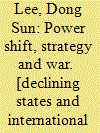

|
|
|
|
|
| Publication |
London, Routledge, 2007.
|
| Description |
x, 214p.
|
| Standard Number |
9780415773386
|
|
|
|
|
|
|
|
|
|
|
|
Copies: C:1/I:0,R:0,Q:0
Circulation
| Accession# | Call# | Current Location | Status | Policy | Location |
| 052842 | 327.112/LEE 052842 | Main | On Shelf | General | |
|
|
|
|
|
|
|
|
|